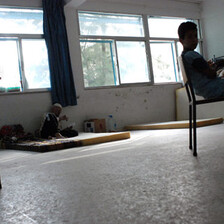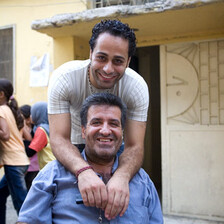Baddawi Refugee Camp 28 May 2007
[PART 1]

A mother of a young wounded girl from Nahr al-Bared holds a fragment of a shell that was in the injured girl’s stomach and had to be extracted in the Saffad Hospital in Baddawi Refugee Camp. (Tanya Traboulsi)
Q: As a representative of the PFLP, what is your reaction towards the Palestinian leadership’s position regarding the shelling of Nahr al-Bared?
A: Honestly, the first day there was sympathy for the soldiers that were killed. But after the shelling started we felt that the targets were not Fatah al-Islam, but rather the Nahr al-Bared camp. I was with a French delegation in Beirut, and five of them were trapped in Nahr al-Bared. I listened to the statements that were issued by the Palestinians, and there were not on the same level as the reaction on the ground. At the end of the day, there is a people that is being shelled and people are dying. Right now I am not concerned with the political issue as much as I am with protecting my people. Honestly, the positions taken should have been clearer. Just as I should say that I sympathize with the soldiers that were killed, it shouldn’t have been said as it was today that Nahr al-Bared or any other camp is a red line [referring to Hasan Nasrallah’s televised speech of 25 May 2007]. My personal opinion is there should have been a comprehensive mobilization from all the camps and the Palestinian parties should have held the Lebanese authorities responsible for its actions. You are shelling a people, 45,000, not distinguishing between civilians and others. Their reaction was very bad, I’m very disappointed by their reaction, like “Oh, maybe if the army goes into the camp, we’ll stand by them”. Of course it shouldn’t be understood that we are against the Lebanese people or the Lebanese authorities, but there is a situation, there is shelling with 155 mm, there is shelling with canons, there are people dying. We still don’t know how many bodies there are under the rubble, but this situation is stretching the limits of our tolerance.
Q: If that’s the case, if no one is speaking of the civilians in the camp, neither opposition nor loyalist, what is the end goal of this conflict between the army and Fatah al-Islam, what is their aim?
A: I want to be honest with you, I’m not afraid of anything. Fatah al-Islam originally were here in the Baddawi camp, the part of them that were later announced [in Nahr al-Bared]. We were suspicious, because there were many strange faces among us. We inquired as to whom these people were, we asked the security forces [in the camp] to go into their apartments and see whom these people were. They felt that there were people asking around about them, which resulted in an internal security incident in which one security agent from the camp died. Two of those caught were handed in to the Lebanese government, a Saudi and a Syrian, and they were moved into Nahr al-Bared. A week later, Fatah al-Islam was announced as a splinter group from Fatah al-Intifada. In the space of less than two weeks, they numbered in the hundreds. A large number of them came from Saida, Taamir, the south, etc. How were these people allowed in? At the same time, women were searched, but they were allowed in without searching. It’s my right to ask the government and the security forces why they were let in. From that time I expected that it would come to this — political scapegoating and exploitation of Fatah al-Islam, a group that encompasses people from more than one political current, and some of them were fighting in Iraq. Why were they allowed to grow? This was political exploitation of the split that is happening in Lebanon and Palestine, these people came instead of the failed policies that the US was trying to implement in Iraq and Israel in Palestine, now it’s Lebanon’s turn. In my opinion Fatah al-Islam is not the target, the fear is that the issue of the right of return will be compromised, the solution to the Palestinian issue will be compromised. If we want to go back a bit, the Israeli-Arab initiative said, “oh, we only have the issue of the right of return, can you please amend it for us?” The issue is political in the first degree; some elements of the Lebanese authorities are trying to take advantage of the situation, and maybe even some parts of the Palestinian authorities are trying to take advantage of it.
Q: Political in the sense of “solving” the Palestinian issue in Lebanon?
A: We are facing two distinct political projects. There is a project of resistance that is trying to counter the American-Zionist ambitions which is represented in Lebanon, in Iraq, and in Palestine. The other political project is the American-Zionist-Arab [one] that calls for a “peaceful solution and moderation” that is trying to solve our problem because unfortunately we are weak. This project is also represented in Iraq, Palestine, Lebanon, and throughout the Arab world. Now the March 14 movement in Lebanon are turning towards the project they are a part of, in coordination with the Palestinian authorities, maybe with Maliki and Karazai as well. The resistance is made up of Hamas, Jihad, and PFLP in occupied Palestine, with Hizbullah in Lebanon and those in Iraq. There may not be coordination between them, we can’t say that we are with the Taliban in Afghanistan, but they are fighting the Americans from their perspective. If they win, it’s better for me than if the American project succeeds. There doesn’t need to be organizational coordination, but there are common interests. Bush himself said, “You’re either with us or against us”. There are people with him, and there are people against him, [this is] the situation very simply. If one project succeeds, it is then that we can assess our relationship with the Taliban, with other groups. That’s the reality of the situation.
Q: What do you think the reaction of the Palestinians in the other camp will be to the army’s shelling of Nahr al-Bared?
A: If a ceasefire weren’t declared three days ago, there would have been an explosive reaction from Rashidiyeh to Bourj al-Barajneh. Some people in the camps spontaneously started considering opening side battles with the army in order to ease the pressure on Nahr al-Bared. The army is not our enemy. Honestly, the army surprised us, and there is a growing sentiment that even the army was put in a difficult position, particularly because of what a split in the army would mean. But I don’t want to get into Lebanese politics, we just hope that there will be some sort of settlement. The army is important, because if the army has a good relationship with the resistance, this is good for us, because Hizbullah supports us. We don’t want them to start a war with us. But at the end of the day, there are people getting killed, and I wouldn’t be surprised if there are some people in Nahr al-Bared who are fighting alongside Fatah al-Islam, because if people are dying, their families are dying, what are they supposed to do? The situation can get dangerously explosive, putting aside the issue of Fatah al-Islam and other similar groups, but the anger is brewing amongst the Palestinians because it is their people who are being killed, and it is not being taken into consideration, and this anger may even manifest itself outside the bounds of official Palestinian structures.
Q: How are people communicating with each other across the camps, how is information getting around on what’s happening?
A: There’s a spontaneous element to what’s happening. People from Rashadiyeh camp feel with us, they know what we’re feeling. Yesterday or the day before there were attempts by some of the young people in various camps to organize something continuous, like solidarity actions, pressure groups, etc. Now it’s calmed down a little because of the cease-fire, but if it gets out of hand, in the end we’re all part of the same neighborhood as they say. We all know each other, I know the camps in the south and they know us, we always communicate. If a decision is taken to level of the camp, even the political factions will not be able to stay neutral, despite the fact that their positions thus far haven’t been satisfactory. If they do they will no longer be Palestinian. So if there is escalation, they will have to take a strong position. At the moment we can’t say that there is actual coordination between people in the different camps, but there is definitely an anger that is spreading spontaneously.
Q: Is there disappointment from the Palestinian people towards the Palestinian authorities because of their political positions?
A: Of course
Q: If there is this disappointment and distrust towards the Palestinian authorities, where can the Palestinian people place their trust?
A: We can talk about that for three hours! The issue is that we also have our own [internal] problems. When I speak of a Lebanese political division I also speak of a Palestinian division. To be honest, the Palestinian people no longer feel that any of the Palestinian factions represent them, not even the PLO. We’d be kidding ourselves if we claimed that. How do they represent the people? We’re all living in camps, if a Palestinian [official] were to meet with a Lebanese he wouldn’t talk about our real concerns and suffering. They have other concerns now, concerns of power and political standing, Gaza and the West Bank, unfortunately. They’re fed up with us and want to unburden themselves of the Palestinian issue in Lebanon, especially that we’ve become a crisis point for them. It’s not like Syria or other places.
There is far reaching disappointment. I’ll give you an example. We’re 18,000 people here in the Baddawi camp. We’d be over the moon if only 10 percent of us were organized. We’re completely in disarray. There is a lack of trust, but our leadership is one we are obliged to accept because there is no other choice. There are no proper popular committees, no proper water, electricity, nothing. It’s a miserable situation. There is a problem, and eventually if this continues a certain change will have take place. Maybe someone will come along with another way of thinking, another ideology, people might end up rallying behind him. It might lead to these things. I don’t want to say that it’s Fatah al-Islam or other similar groups, but its possible. If Fatah al-Islam starts providing basic social services to the people and speaking out for them then maybe everyone would rally behind them.
Q: Building on that point, no one is speaking about the possibility for recruitment by these sorts of groups through the basic social services that they might offer, particularly because there is this sort of lack.
A: To be honest, we’re an emotional people. The Palestinian cause is very important, but experience also plays a part. If a human being finds that a certain experience or way of thinking has failed, he’s going to go in search of other paths. A simple example: The Islamic organizations in the Palestinian sphere were non-existent before 1982, although it was the secular, leftist organizations and parties that actually started the revolution. Now they’ve been brushed aside, they’re in second place. Now Hamas and Jihad, especially Hamas, (of course they’re Palestinian and differ greatly from Fatah al-Islam) introduced a new ideology that gained momentum and support and they were able to take hold of the situation. Through their freedom fighters (mujahadeen) they fulfill their Palestinian national duty, and through their services and institutions, they fulfill their social duties towards the people. This is what I meant. I’m not saying that the Taliban can come in and take over at all, but something needs to be done. Maybe someone will come along with the ability to ride this momentum and rally the people. Hamas is a simple but important example. In the past 18 years, Hamas has risen to become the most important power in the Palestinian sphere. This wouldn’t have happened if there was trust in the PLO, not just in terms of services but also in politically; Oslo weakened the PLO greatly and bolstered Hamas. Now, in occupied Palestine after the Mecca agreement, they’ve started asking whether it is possible for Hamas to be weakened quickly, do you see what I’m saying? This is what I’m talking about. The people are lost, sadly. They all know the end goal of course, but there needs to be a strong organizing political force; the people can’t lead themselves. This is the logic and the narrative of history. Something must change, maybe in five years, maybe in 10, except if these officials in the PLO or Hamas take very good care to prioritize the concerns of the people.
Take the example of Al-Qaeda. Why does Al-Qaeda have so much popularity, even though it doesn’t have organizational support of the people? It’s primarily the inability of the Arab states to fight Israel. Why is Al-Qaeda now in the Arab Levant? To improve its image! Why is it that people can say that I’m with Al-Qaeda because they’re killing Americans, even though if you want to look at its ideology, you’d cleanse yourself of it? But there remains sympathy for them. They’re fighting in Iraq, they might later fight in Palestine, and then everyone will become Al-Qaeda! I don’t know what their motives are, they might be exploiting a certain situation, but if they fight Israel and offer people services then the whole world will become Al-Qaeda. And it’s grown since September 11, they’ve doubled; no, they’ve become a hundred times larger.
Jackson Allers is a Middle East correspondent for Inter Press Service, Free Speech Radio News and has produced for Al Jazeera International’s “People and Power.” He is based in Beirut, Lebanon.
Rasha Moumneh has an MSc in social anthropology from University
College London. She lives in Beirut, and works mainly in the fields of
gender and sexuality rights in western Asia. She is a member of the Nahr el Bared Relief Campaign and can be contacted at: r.moumneh [at] gmail [dot] com.
Related Links





